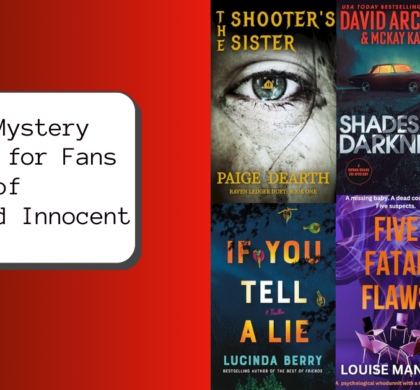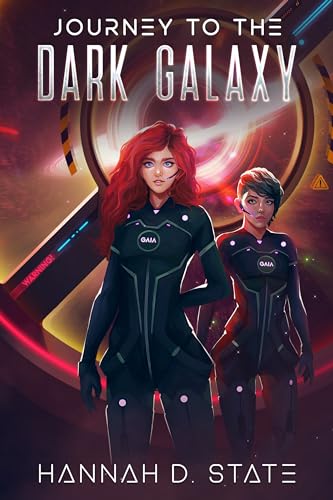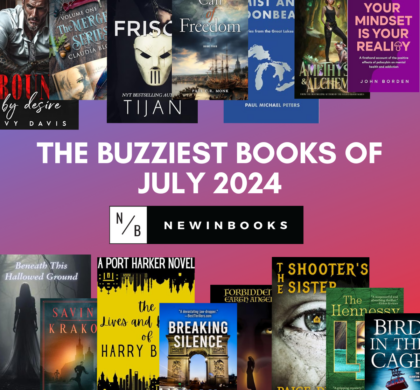Interview with Hannah D. State, Author of Journey to the Dark Galaxy
25 Jan 2024
What’s the story behind the story? What inspired you to write Journey to the Dark Galaxy?
In Journey to the Dark Galaxy, which is a sequel to Journey to the Hopewell Star, I wanted to continue Sam’s adventure with her friends but also explore darker themes. I wrote it during the pandemic, a time of severe isolation and perhaps loneliness, too, and played around a lot with those themes in the book. The stakes are higher. Sam is dealing with both physical isolation (being so far from her grandfather and home) and mental isolation. She’s forced to adapt, question her situation and circumstances, learn what she can, and mature quickly.
If people haven’t read the first book in the series, that’s okay. The sequel is written in such a way that you don’t need to read the first book to understand the story. People can approach these books in whatever sequence they want.
The inspiration for this book came from different experiences. Part of the story takes place at an underwater military base with leading-edge technologies. When I first started my career in the Canadian civil service as a contract administrator over a decade ago, I worked at a Defence R&D laboratory in Toronto, Ontario. The lab has a wonderful history of innovation and bright scientists and staff making medical advancements in the military field, including Sir Frederick Banting, the discoverer of insulin, who established groundbreaking research in aviation medicine. His team included Wilbur Franks, who developed the first g-suit (a.k.a. the Franks Flying Suit), which prevented pilots from blacking out when subjected to g-force during flight maneuvers. They also developed and constructed a human centrifuge, which was used to train air force pilots and, later, Canadian astronauts.
The technologies in my story are from my imagination, but I was inspired by that experience and loved working in that science setting. Just to set the record straight, in the story, the base and its employees are written in an eerie way (it’s important to give our characters challenges) and in no way reflect my personal experience. The people I worked with were awesome.
With the sequel, I wanted to experiment a bit and bring in new characters with different backgrounds and experiences. I wanted to create a bit of mystery. Kwan was a fun character to write. She has incredible skills but a difficult past. As the story progresses, she realizes her memories are unreliable, and she ends up questioning her own identity. It goes with the darker tone of the book. Memories are an interesting phenomenon. In part, they help us define who we are. But I didn’t realize how fragile memories were until I read Dr. Julie Shaw’s non-fiction book The Memory Illusion. It’s not science fiction. Memories can be tampered with. People can be made to believe they’ve committed crimes. Scary stuff. Building upon that premise, I wanted Kwan, in the course of her journey, to uncover difficult truths about herself and the organization she works for. It’s as much Kwan’s story as it is Sam’s. I didn’t want to place Sam in the role of the sole heroine. I wanted the characters to challenge and support each other, experience (at times shocking) revelations, go through transformations together, and grow from the experience.
Lastly, on the theme of artificial intelligence, I’m interested in how fast it is advancing and how it’s being used. I’ve been reading a lot of AI-related articles in the news lately. Governments around the world are using technology for population tracking, and in my opinion, it’s intrusive and frightening. I wanted to explore AI further, including the ethics and risks. Especially today, when kids are exposed to technology at such a young age, there is so much potential for disaster, vulnerability, privacy invasion, and manipulation. It’s definitely a scary world. At least the subject matter makes for intriguing stories. I want people who read this book to be bothered by the themes. I hope it forces people to question the power and control (or lack of control) we have with these new technologies.
What’s your favorite genre to read? Is it the same as your favorite genre to write?
I enjoy reading a wide variety of genres, such as science fiction, fantasy, thriller, mystery, literary fiction, poetry, historical fiction, and non-fiction memoirs and biographies. My favorite genres to write are science fiction and fantasy while incorporating some thriller and mystery elements, but I would love to branch out and try writing in a different style and experiment with other genres.
What books are on your TBR pile right now?
There are a lot of books on my TBR pile, and I’m a slow reader. I tend to re-read passages and really savor the stories.
Here are a few: Lagoon by Nnedi Okorafor, Conversations with RBG by Jeffrey Rosen, Still Life by Louise Penny, Room by Emma Donoghue, The Power by Naomi Alderman, The Light We Carry: Overcoming in Uncertain Times by Michelle Obama, Iron Flame by Rebecca Yarros, I Am Malala: The Story of the Girl Who Stood Up for Education and was Shot by the Taliban by Malala Yousafzai and Christina Lamb, Where the Crawdads Sing by Delia Owens, and many, many others.
What scene in your book was your favorite to write?
One of the scenes I very much enjoyed writing was when Sam and Kwan are on their journey to the Dark Galaxy and need to make a pit stop for fuel. They land on a planet where Sam believes they will receive a warm welcome, but it turns out it’s inhabited by a hostile civilization. It was fun playing up her expectations and then forcing her to use her wits to escape a truly dire situation.
Do you have any quirky writing habits? (lucky mugs, cats on laps, etc.)
Nothing super quirky. I’m grateful for my writing assistant, Josie, a West Highland Terrier, who keeps me on my toes and reminds me to take breaks. I take frequent walks to allow my mind to wander and daydream while my subconscious works out any issues. My writing routine requires a quiet space and a good cup of tea.
Do you have a motto, quote, or philosophy you live by?
One of my managers explained to me once that people won’t remember what you did, but they will remember how you made them feel. It resonated with me, and I try to extend this to my relationships with others and my writing, too. Kindness is so important, especially in this crazy world. In the writing context, over time, I’ve learned that stories are about eliciting emotions in the reader and sharing thoughts. I’ve tried to develop stories that are more character-driven, fueled by their feelings and experiences and how they relate to each other, rather than solely focusing on world-building and plot. It’s characters who drive stories. They change things and can inspire.
If you could choose one thing for readers to remember after reading your book, what would it be?
When Sam Sanderson returns from her journey, she reflects on life and her transformation. She realizes that life is riddled with challenges and grim experiences. And instead of taking the simple path or avoiding the tough situations, she embraces the difficulties and looks at them as opportunities to push herself forward. She grows and learns from her experience. Over time, I’ve come to realize that challenges are not there to push you down and keep you there. They’re there to shape you and make you stronger, develop you into a more well-rounded and interesting person, teach you how to adapt, and allow you to rise up.
If readers are going through a particularly difficult time, I hope they realize the power they hold inside themselves. It’s important to never give up. Because things don’t stay the same forever. There’s a whole universe of possibilities. It’s important to be kind to others and to yourself because then you’ll make the world a better place.
Hannah D. State is the author of the new book Journey to the Dark Galaxy
Connect with Hannah D. State
Sign up for our email and we’ll send you the best new books in your favorite genres weekly.
Related
grant
Recommended Posts

New Mystery Novels for Fans of Presumed Innocent
26 Jul 2024 - Books to Read if You Like..., eBook, Mystery, News, Thriller

New Romance Novels to Steal Your Heart
26 Jul 2024 - Books to Read if You Like..., eBook, News, Romance


